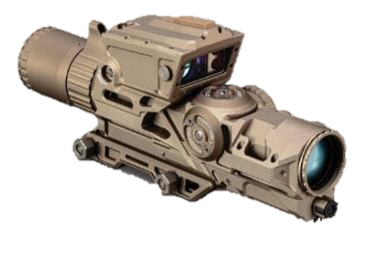The Army has picked Sig Sauer to build and deliver its Next Generation Squad Weapon variants, according to a release issued late Tuesday.
The weapon takes 6.8mm cartridges and will come in both rifle and automatic rifle variants.
Sig Sauer won a 10-year contract with an initial delivery order worth $20.4 million. Their design has similar configurations and ergonomics to existing rifle platforms.
The company will now provide both the individual rifle, light machine gun and handgun, having won the handgun contract in 2017. That makes it the provider of the vast majority of small arms to the close combat forces and likely special operations forces.
RELATED

The NGSW is the Army’s solution to range, accuracy and lethality problems in small arms for the close combat force. It will replace the M4 carbine in the infantry, scouts and combat engineer communities.
The M4 will continue to be used by general purpose forces, essentially all other soldiers in the Army for the coming decades. Marines are also expected to receive quantities of the weapons for their close combat forces.
The rifle variant is currently dubbed the XM5 and the automatic rifle is named the XM250. The “X” status remains until fielded in most Army naming conventions.
The intermediate caliber 6.8mm cartridge falls between the 5.56mm, which is in the M4 and the M249 Squad Automatic Weapon, and the 7.62mm round in the M240 machine gun.
The 6.8mm round has greater lethality at distances beyond the effective range of the 5.56mm and retains better accuracy than the 7.62mm.
The XM250 automatic rifle will replace the SAW in close combat units.

The decision to pursue an intermediate caliber round came out of the Small Arms Ammunition Configuration Study, which emerged from concerns about body armor improvements among Russian and potentially Chinese troops.
Over a 27-month prototyping and testing periods, hundreds of soldiers, Marines and special operations forces tested and evaluated the rifle and automatic rifle prototypes.
“Both weapons provide significant capability improvements in accuracy, range and overall lethality. They are lightweight, fire more lethal ammunition, mitigate recoil, provide improved barrel performance, and include integrated muzzle sound and flash reduction,” reads the Army’s Tuesday news release.

Both weapons will feature the XM157 Fire Control optic, which is being made under a contract won by Vortex Optics subsidiary Sheltered Wings in January. That contract will be worth $2.7 billion over the next 10 years, according to government documents.
“The NGSW-FC system is a ruggedized fire control that increases accuracy and lethality for the Close Combat Force. It integrates a number of advanced technologies, including a variable magnification optic, backup etched reticle, laser rangefinder, ballistic calculator, atmospheric sensor suite, compass, Intra-Soldier Wireless, visible and infrared aiming lasers, and a digital display overlay,” reads a January release from the Army’s Cross Functional Team-Soldier Lethality.
Textron Systems and Lone Star Future Weapons both provided prototypes that made it to the late stages of the rifle competition with Sig Sauer.

The Textron System featured a cased telescoped ammunition that reduced overall cartridge length and used a polymer casing to reduce weight.
The Lone Star option featured a bullpup design where the magazine feed was mounted behind the grip, a feature common in some European-manufactured rifles.
In 2017, Sig Sauer also won the contract to provide the M17 and M18 handguns for the Army, replacing the Beretta M9 after three decades of service.

Todd South has written about crime, courts, government and the military for multiple publications since 2004 and was named a 2014 Pulitzer finalist for a co-written project on witness intimidation. Todd is a Marine veteran of the Iraq War.








